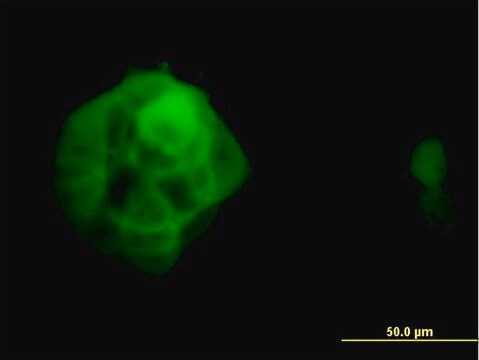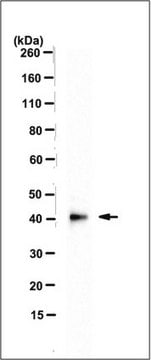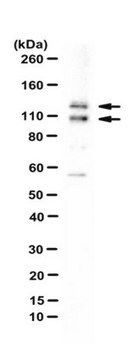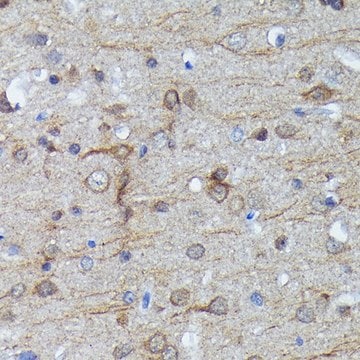MABN763
Anti-Ubiquilin 2 Antibody, clone 6H9
clone 6H9, from mouse
Szinonimák:
Ubiquilin-2, Chap1, DSK2 homolog, Protein linking IAP with cytoskeleton 2, PLIC-2, hPLIC-2, Ubiquitin-like product Chap1/Dsk2
About This Item
Javasolt termékek
biológiai forrás
mouse
Minőségi szint
antitest forma
purified immunoglobulin
antitest terméktípus
primary antibodies
klón
6H9, monoclonal
faj reaktivitás
human, mouse
technika/technikák
immunocytochemistry: suitable
western blot: suitable
izotípus
IgG1κ
NCBI elérési szám
UniProt elérési szám
kiszállítva
wet ice
célzott transzláció utáni módosítás
unmodified
Géninformáció
human ... UBQLN2(29978)
Általános leírás
Immunogen
Alkalmazás
Neuroscience
Developmental Signaling
Immunocytochemistry Analysis: A representative lot detected Ubiquilin 2 in HeLa cells.
Minőség
Western Blotting Analysis: 1.0 µg/mL of this antibody detected Ubiquilin 2 in 10 µg of U-251 cell lysate.
Cél megnevezése
Fizikai forma
Tárolás és stabilitás
Egyéb megjegyzések
Jogi nyilatkozat
Nem találja a megfelelő terméket?
Próbálja ki a Termékválasztó eszköz. eszközt
Tárolási osztály kódja
10 - Combustible liquids
WGK
WGK 2
Analitikai tanúsítványok (COA)
Analitikai tanúsítványok (COA) keresése a termék sarzs-/tételszámának megadásával. A sarzs- és tételszámok a termék címkéjén találhatók, a „Lot” vagy „Batch” szavak után.
Már rendelkezik ezzel a termékkel?
Az Ön által nemrégiben megvásárolt termékekre vonatkozó dokumentumokat a Dokumentumtárban találja.
Tudóscsoportunk valamennyi kutatási területen rendelkezik tapasztalattal, beleértve az élettudományt, az anyagtudományt, a kémiai szintézist, a kromatográfiát, az analitikát és még sok más területet.
Lépjen kapcsolatba a szaktanácsadással








